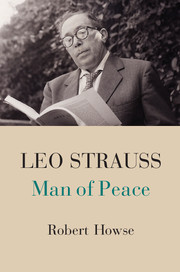Book contents
- Frontmatter
- Dedication
- Contents
- Preface and Acknowledgments
- 1 Introduction
- 2 Warrior Morality and the Fate of Civilization
- 3 Legitimacy and Legality, Thinking and Ruling in the Closed Society and the World State
- 4 Strauss’s Machiavelli
- 5 Thucydides versus Machiavelli
- 6 Justice and Progress
- 7 Conclusion
- Abbreviations
- Index
- References
5 - Thucydides versus Machiavelli
A Moral-Political Horizon of War and Law
Published online by Cambridge University Press: 05 September 2014
- Frontmatter
- Dedication
- Contents
- Preface and Acknowledgments
- 1 Introduction
- 2 Warrior Morality and the Fate of Civilization
- 3 Legitimacy and Legality, Thinking and Ruling in the Closed Society and the World State
- 4 Strauss’s Machiavelli
- 5 Thucydides versus Machiavelli
- 6 Justice and Progress
- 7 Conclusion
- Abbreviations
- Index
- References
Summary
Introduction
In Thoughts on Machiavelli, Strauss’s differences with Machiavelli come out most sharply when he compares Machiavelli not to Plato and Aristotle but to Xenophon and Thucydides; Xenophon and Thucydides see clearly the half of reality, the realm of harsh necessity, to which Plato and Aristotle may appear largely blind or, more precisely, willfully blind. But, at the same time, Thucydides has something that Machiavelli lacks: a sense of the sacredness of the common, evidenced in ordinary moral psychology by the feeling of sadness at the sight of injustice, suffering, and destruction of humans, beasts, and civilizations (TOM, p. 292).
Rejecting the frequently held view of Thucydides as a scientific historian or precursor of realism in international relations theory, Strauss reads Thucydides’ work as containing a comprehensive teaching about politics and human nature, indeed, for the reason just given, more comprehensive than Machiavelli’s. In response to Machiavelli and his heirs and to what Machiavelli identified as an essential defect of classical political philosophy (its utopian abstraction from harsh necessity), Strauss constructs a political philosophy of Thucydides (the title of his 1962 winter seminar). As he says early on in the seminar, one of the challenges he has set for himself and the students is to see “whether it is possible to integrate the understanding of the city in motion into the understanding of the city at rest, which Plato had described” (PPT, Lecture II, p. 19).
- Type
- Chapter
- Information
- Leo StraussMan of Peace, pp. 123 - 148Publisher: Cambridge University PressPrint publication year: 2014



